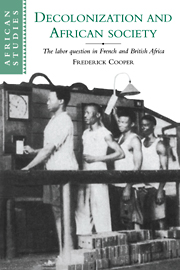Book contents
- Frontmatter
- Contents
- List of tables and figure
- Preface
- List of abbreviations
- Map of French and British colonial Africa
- 1 Introduction
- Part I The dangers of expansion and the dilemmas of reform
- Introduction
- 2 The labor question unposed
- 3 Reforming imperialism, 1935–1940
- 4 Forced labor, strike movements, and the idea of development, 1940–1945
- Conclusion: posing the labor question
- Part II Imperial fantasies and colonial crises
- Part III The imagining of a working class
- Part IV Devolving power and abdicating responsibility
- Conclusion
- Notes
- Bibliography
- Index
- OTHER BOOKS IN THE SERIES
2 - The labor question unposed
Published online by Cambridge University Press: 22 February 2010
- Frontmatter
- Contents
- List of tables and figure
- Preface
- List of abbreviations
- Map of French and British colonial Africa
- 1 Introduction
- Part I The dangers of expansion and the dilemmas of reform
- Introduction
- 2 The labor question unposed
- 3 Reforming imperialism, 1935–1940
- 4 Forced labor, strike movements, and the idea of development, 1940–1945
- Conclusion: posing the labor question
- Part II Imperial fantasies and colonial crises
- Part III The imagining of a working class
- Part IV Devolving power and abdicating responsibility
- Conclusion
- Notes
- Bibliography
- Index
- OTHER BOOKS IN THE SERIES
Summary
The French and British governments participated in a European discussion about themselves as colonial powers and about Africans as subjects, even as they competed with each other for territory and trade. They quickly encountered the limitations of imposing change on people with wills of their own. The following pages explore the tension between frameworks for thinking about labor and colonialism among officials and Europeans concerned with questions of empire and the messiness of an historical encounter.
Free labor ideology codified
The argument that blacks needed the stern supervision of a civilized state before they could embark on the “natural course” of market rationality helped European powers to acquire a sense of themselves as progressive imperialists in the course of the late nineteenth-century conquest of Africa. Africa as a slave-ridden continent – oppressed and kept off the path to civilization, Christianity, and commerce by its own tyrants – became the central image of missionary propaganda and later a key basis of pro-imperialist argument. The turn to state intervention overseas was consistent with the increasing social interventions of regimes in Europe itself – state efforts to transform the “residuum” of capitalist development into “respectable” working classes. Although the old Europe had profited from and stimulated African violence, the new Europe preferred that economic expansion be predictable and orderly and that social structures be capable of extending and reproducing themselves. In the midst of their rivalries, the imperial powers met in the 1880s and 1890s to set out the rules of the game, and they insisted that colonizing powers suppress the slave trade, as well as traffic in arms and liquor.
- Type
- Chapter
- Information
- Decolonization and African SocietyThe Labor Question in French and British Africa, pp. 25 - 56Publisher: Cambridge University PressPrint publication year: 1996



